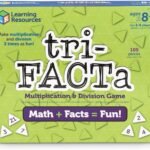My family grew up playing games. When I think back to my favorite times from my childhood it was over the kitchen table with a game between my 3 older brothers, myself and my parents. This is where the inside jokes that we still use came from and it is where I first learned that my mom, dad and older brothers might love me, but they would never let me win.
My love for games has been passed on to my daughter. She doesn’t just love playing games, she loves to make things into a game. She has even figured out a way to make chores around the house into a game so that she can have fun while doing it. If gamification was her assignment, she would ace it every time. This is one of the many reasons we try to incorporate games into our homeschool week as much as possible. I wouldn’t go so far as to say we are a gameschooling family (we are more eclectic than anything), but we definitely play our fair share of games to keep things lively.
Gameschooling: What is It?
Gameschooling is the use of games to learn. Some families use games exclusively. Others use games to supplement their homeschooling curriculum. Now, that doesn’t mean you just play whatever game whenever you feel like it and call it homeschooling. The key is to be intentional in your game choices in order to teach specific skills. For example, if you would like your child to work on inductive reasoning, you could play Apples to Apples, Scrabble or Sudoku. If you want them to practice addition, almost any game with dice, dominoes or cards will work. For critical thinking I’m a huge fan of the age old game of chess.
Why Gameschooling?
There are several benefits of including gameschooling in your homeschool toolbox. Here are a few to start:
- Playing games as a family can create bonding and lifetime memories. One of the greatest things about homeschooling is that we get so many more opportunities to create lasting memories with our kids than other parents. Playing games is one of the best ways I have experienced for creating those memories. As I mentioned, I grew up playing games as a kid. My family still plays games together every chance we get. In fact, I recently moved closer to family and started hosting a monthly game night, because on holidays was just not cutting it. And the cool thing is that now we get to have our own kids play alongside us, and sometimes even beat us.
- Games build interpersonal skills. We have all heard that homeschoolers are terribly socially awkward and don’t know how to communicate with others. Well guess what, games are one of many ways to combat that. Games allow kids (and adults) to learn patience, taking turns, group collaboration, and how to lose gracefully or on the flip side not rub it in someone’s face when they win. They can also teach ethical and moral lessons such as if you always cheat no one will want to play with you.

- Games can teach. Some games are educational by design. Others just happen to have a learning component, though fun is their main goal. At our house we have both options. Sometimes when we play a game during school time the whole purpose is to have a brain break. And other times the goal is to either teach a concept that isn’t sticking other ways or to reinforce/practice what we already know. For example, this year I added Tr-facta to our game closet as we were starting 4th grade. My daughter needed more practice with her multiplication and Tri-facta is a way for her to practice her fact families.
- Engagement and Motivation. Games can make learning more enjoyable and engaging. What homeschooling parent couldn’t use their students paying attention a bit more? Playing games can help with that.
- Games are fun. Adding games into homeschooling can make the learning process more fun for students and parents alike. When students are engaged and having fun, they are more likely to retain information and develop a positive attitude towards learning.
How to Gameschool
So how do you get started with incorporating games into your homeschool day? The first thing is to make a list of the games you currently have on hand and see which skills they can teach your kids. LearningRx has created a great pdf tool listing several games and the areas of learning they target. You can download it here.
As you build your game library I suggest you make a list of games you would like to add over the next year and set a budget. Games can get very expensive. Here are some tips for building your game library inexpensively:
- Put games on yours and your kid’s Christmas lists for extended family members. If needed, communicate with grandparents and aunts and uncles about your goal of building your game library to help in your homeschooling.
- Keep your eyes peeled at Goodwill, children’s consignment shops, yard sales, flea markets and clearance racks. My local Meijer also tends to have some great buy one get one half off sales close to the holidays.
- Ask you local library if they have games available. If they don’t currently, they may add them if you and others show enough interest.
- Form a gameschooling co-op with other local homeschool families. You can pool your game resources to make everyone’s game library bigger. One way to set it up is to have frequent game days. Another way is to do a game exchange program or create a community game library.
The key with gameschooling is to be intentional about the games you bring into your homeschool in order to teach specific subjects and skills. You can go all out with gameschooling and play multiple games a day. Or you can use games as a supplement to your core curriculum. It is your choice on what works best for your family and your homeschool. Just be sure to have a bit of fun with it!





